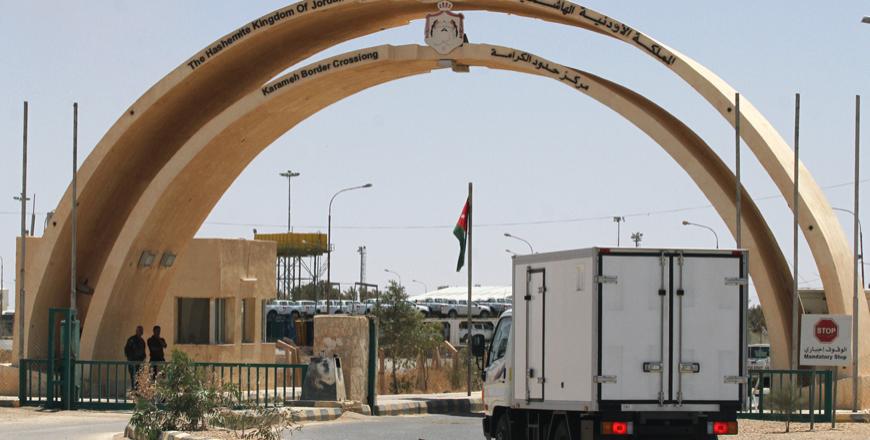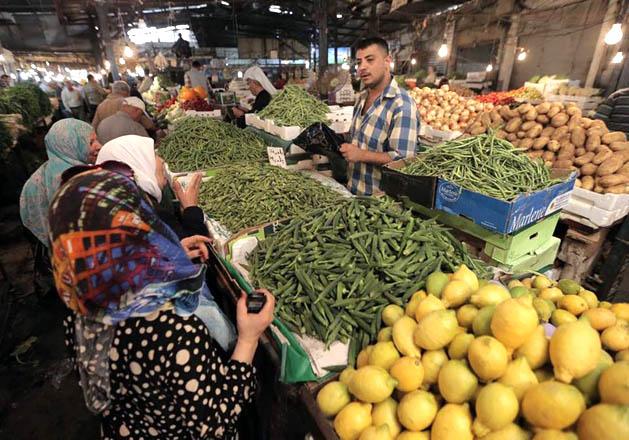You are here
Authorities studying option of direct maritime route to Iraq
By Dana Al Emam - Jul 22,2015 - Last updated at Jul 22,2015

The closure of Iraq’s main border crossing with Jordan late last week until further notice occurred days after an offensive was launched to reclaim the western province of Anbar from the Daesh terrorist group (File photo)
AMMAN — Authorities are studying the option of a direct maritime route to transport goods to Iraq as an alternative to land freight, in light of Baghdad’s recent decision to close the border with Jordan, according to sector insiders.
The closure of Iraq’s main border crossing with Jordan late last week until further notice occurred days after security forces and Shiite militias launched an offensive to reclaim the western province of Anbar from Daesh terrorist group militants, Reuters reported.
In a meeting with stakeholders on Wednesday, Minister of Industry, Trade and Supply Maha Ali said talks are under way with Saudi Arabia and Kuwait to allow Jordanian trucks to transit through to Iraq, to decrease fees and save time, according to a statement sent to The Jordan Times.
The ministry is studying the maritime option for Jordanian exports or transit goods through Aqaba Port to Iraq’s Um Qasr Port.
Also, the ministry is communicating with concerned Iraqi entities to reopen the border and exempt Jordanian exports from a 5 per cent fee for Iraq’s reconstruction.
Some merchants already export goods to Iraq through existing indirect maritime routes from Aqaba to Iraq’s Um Qasr or Basra, which take 15 to 25 days, said Jordan Shipping Association Chairman Bassam Jazy, adding that a direct line would reduce the duration by four to eight days.
However, it would increase fees by an estimated 20 per cent, which leaves it up to the merchants to decide on the feasibility of the maritime option.
Jazy added that maritime transportation is ineffective for fruit and vegetables as they can easily go rotten, while transporting plastic products is also unfeasible due to the light weight and large volume of cargo.
He told The Jordan Times that it is “difficult” for a maritime carrier to start a direct line from Jordan to Iraq without certain guarantees, as it would suffer great losses if the border reopens.
For his part, Amman Chamber of Commerce President Issa Murad said Iraq is a market for around 20 per cent of Jordanian products.
As the majority of Jordanian exports to Iraq — worth JD1 billion annually — currently pass through Saudi Arabia to Kuwait and then to Iraq, he cited efforts to facilitate inspection procedures with authorities in Saudi Arabia and Kuwait to reduce time, and therefore maintain the quality of shipments.
Prime Minister Abdullah Ensour on Tuesday said the government is following up with specialised entities in Saudi Arabia, Kuwait and Iraq to cut red tape at border crossings, adding that the neighbouring countries “definitely understand the challenges facing Jordanian exports in light of the security conditions in the region”.
Commenting on the maritime option, Murad said it would cost around $3,500 per shipment, while the cost of land freight to Iraq at present can reach up to $5,000.
Another option is reopening the Arar Border Crossing with Saudi Arabia, a matter that Musa Saket, a board member of the Amman Chamber of Industry and the Jordan Chamber of Industry (JCI), believes is “very difficult” as it has been closed for so long.
He noted that the issue can only be resolved through the maritime alternative, as the land route through Saudi Arabia and Kuwait entails emptying Jordanian trucks of goods and loading them into Saudi or Kuwaiti vehicles in order to enter Iraq — a long process with extra fees.
Although the maritime option could be more expensive for some merchants, it is safer, according to Saket.
During the first four months of this year, the value of Jordan’s exports to Iraq reached JD225 million, registering a 26 per cent drop compared to the same period of 2014, said JCI Director Maher Mahrouq, who noted that the border was open intermittently during that period.
He cited Iraq as a final destination for Jordanian products that mainly include foodstuff, plastic and chemical materials, cosmetics, paints and cement.
New markets
Mahrouq suggested looking for new non-traditional markets for Jordanian products, such as East Africa.
But Saket said it is “not easy” as it takes many years to penetrate a new market.
Opening new markets entails official support for participation in conferences and exhibitions as well as official delegations to prospective countries, he added.
Nonetheless, it is a “crucial” step, because, even if the Iraqi border reopens, “it might close again,” Saket noted.
Zuhair Jweihan, president of the Jordan Exporters and Producers Association for Fruits and Vegetables, said the Iraqi border has been unofficially closed for over a month, citing a 30 per cent drop in agricultural exports during that period.
The drop in exports increased the quantities of produce in the local market, thus severely lowering prices.
But Agriculture Ministry Spokesperson Nimer Haddadin has said that the border closure has not affected the flow of Jordan’s agricultural exports to Iraq.
In a statement on Monday, he added that 61 Jordanian trucks loaded with fruits and vegetables have entered Kuwait since Friday, of which 45 continued their way to Iraq.
Related Articles
AMMAN — Agricultural representatives on Wednesday commended the reopening of the Karameh-Turaibil border crossing between Jordan and Iraq, s
Investors in Jordan’s free zone in Zarqa are exploring safe venues to enter the Iraqi market as fighting in districts near the Jordanian border has forced them to halt their exports via Treibil.
AMMAN — Prime Minister Abdullah Ensour on Tuesday headed a meeting at the Prime Ministry to discuss the obstacles facing Jordanian exports t

















